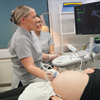At every antenatal appointment that you have, your midwife will check your blood pressure. It’s an important part of looking after you and your baby during pregnancy as your blood pressure needs to remain at a healthy level.
How Will My Blood Pressure Change in Pregnancy?
Your blood pressure is likely to change a little during pregnancy, that’s completely normal. During your first and second trimester, your blood pressure may drop due to the hormone progesterone relaxing the walls of your blood vessels. If you get up too quickly or stand up for too long you might start to feel faint. Your blood pressure is at its lowest in mid-pregnancy and then it starts to increase from around week 24 of pregnancy. By this time, you’ll have made an extra 2.5 pints of blood that your heart has to pump around your body.
In the last few weeks before your baby is born, your blood pressure should return to its pre-pregnancy levels, if everything is ok.
How Is My Blood Pressure Measured?
Your midwife will use a small monitor to measure and record your blood pressure at every antenatal check-up. Before your blood pressure is measured, you’ll be asked to sit down and remove any tight clothing from your arm. A cuff is then placed around your arm above your elbow and your midwife will pump air into it.
The cuff then inflates and stops the blood flow in the main blood vessel in your arm for a very short period of time. It will feel very tight, but it shouldn’t hurt. The air then gets released. The cuff is attached to the monitor, which calculates your blood pressure and shows it to your midwife.
The reading will show two figures that looks like a fraction. For example, 108/71. The first number tells your midwife about your blood pressure as your heart pushes the blood round your body. The second number is your blood pressure when your heart relaxes between beats.
What’s normal for you could be different from other mums-to-be, so it’s best not to compare results. The average blood pressure range if you’re healthy is between 110/70 and 120/80 but this can vary a lot in pregnancy.
If your midwife discovers you have high blood pressure during your antenatal appointment, she will refer you to the hospital for further testing. You may be there for hours while your blood pressure is monitored over a few hours.
High blood pressure has different names. Depending what stage you are at in your pregnancy when you develop it:
Before 20 weeks of pregnancy, high blood pressure is called chronic hypertension or pre-existing high blood pressure. This means it’s likely that you had high blood pressure before you fell pregnant. You’ll only know for sure if this is true if your blood pressure stays high after your baby is born.
After 20 weeks, high blood pressure is called gestational hypertension. This is the name for high blood pressure that develops only during pregnancy. Gestational hypertension isn’t usually a problem, although you will be referred to hospital for specialist care.
Why Is My Blood Pressure Measured?
To tell how well your pregnancy is going, your blood pressure is continuously monitored. Your midwife is looking out for signs of a potentially serious complication called pre-eclampsia, particularly later on in your pregnancy.
Pre-eclampsia isn’t fully understood but it is thought to be caused when the placenta isn’t working as well as it should. This can lead to high blood pressure and other problems. Your urine will be tested at the same time a takin your blood pressure. Protein in your urine and high blood pressure are both signs of pre-eclampsia. For more information regarding pre-eclampsia, please read our previous blog.
Will My Blood Pressure Go Down After the Birth?
It is likely that your blood pressure will return to normal after your baby is born if you developed high blood pressure after 20 weeks, though it can take a few weeks.
Within six hours of your baby’s birth, your blood pressure will be checked atleast once. Afterwards, if you had gestational hypertension, it will be checked at least twice more over the coming days by your midwife.
If your blood pressure remains high, you may be given medication to control it for a few months after you’ve had your baby. This is just a pre-caution and you can still take the medication if you intend to breastfeed.
Once you have been discharged by your midwife, you should make an appointment with your GP to be reviewed. If you had pre-existing high blood pressure, you may continue to need medication. This is because it is unlikely to go down after you’ve given birth.













 Packages & Prices
Packages & Prices  Important Info & Policies
Important Info & Policies  Your Scan
Your Scan